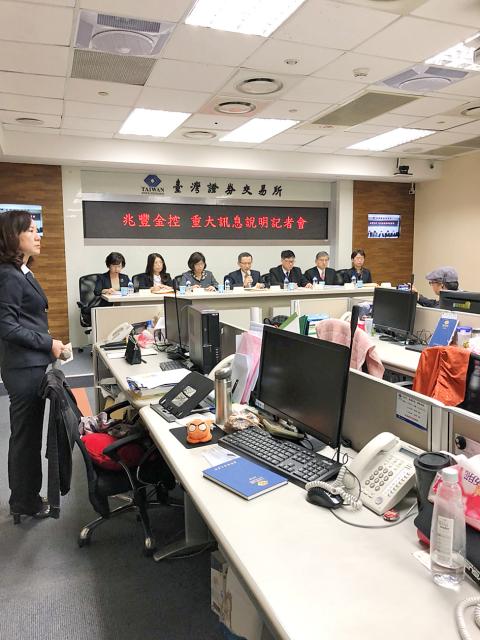State-run Mega International Commercial Bank (兆豐銀行) yesterday said it has agreed to pay a US$29 million fine to US federal financial regulators for compliance failures at three US branches.
The banking arm of Mega Financial Holding Co (兆豐金控) attributed the latest penalty to previous breaches of US money laundering and banking secrecy laws, for which it had already paid a fine of US$180 million in 2016 to the New York State Department of Financial Services.
Those deficiencies prompted the US Federal Reserve Board to conduct inspections of Mega Bank’s branches in New York, Illinois and California, and hand down the new fine, Mega Bank president Bruce Yang (楊豊彥) told a news conference at the Taiwan Stock Exchange.

Photo: CNA
US federal authorities also required the bank to come up with measures to strengthen its money laundering oversight and controls, Yang said.
“The new fine stemmed from old breaches,” which had triggered a reshuffle of top executives and eroded much of the lender’s earnings in 2016, he said.
Mega Financial reported NT$26.62 billion (US$900.5 million) in net income for last year, or earnings per share of NT$1.96, despite higher provision and compliance costs, a bank official said by telephone.
The results suggest a double-digit percentage increase from NT$22.39 billion in profit recorded in 2016, although the final figures would soften after recognition of the new fine, which amounts to NT$857.29 million, said the official, who asked not to be named.
Mega Financial aims to book the new fines on last year’s earnings, the official said, adding: “Despite the bad news, the company managed to meet its earnings target last year.”
Mega Financial has been introducing corrective measures and upgrading its computer system, but it might take a while to get everything back on track in light of the complexity involved, Yang said.
Mega Financial denied any involvement in money laundering and apologized for its loose internal controls causing a stir in Taiwan and the US.
The bank-focused conglomerate turned conservative on lending operations following the 2016 fine, setting a mild increase of 1.5 percent to 2 percent in its loan books last year, and halting a search for acquisition opportunities at home and abroad.
The Financial Supervisory Commission said it would conduct an examination of three Mega Bank branches in the US and might issue more fines to the lender, after it slapped it with a fine of NT$10 million on Sept. 4, 2016.
The commission said it would wait and see how the US responds to Mega Bank’s progress in improving the issue before deciding whether and how much to fine the bank again.
The Executive Yuan said the US$29 million fine would not affect the Asia/Pacific Group on Money Laundering’s evaluation of Taiwan this year, which is a key indicator of the nation’s efforts to prevent money laundering in line with international standards.
Cabinet spokesman Hsu Kuo-yung (徐國勇) said the US federal system allows both federal and local governments to issue separate punishments for the same violation.
Additional reporting by Chen Wei-han and CNA

Authorities have detained three former Taiwan Semiconductor Manufacturing Co (TMSC, 台積電) employees on suspicion of compromising classified technology used in making 2-nanometer chips, the Taiwan High Prosecutors’ Office said yesterday. Prosecutors are holding a former TSMC engineer surnamed Chen (陳) and two recently sacked TSMC engineers, including one person surnamed Wu (吳) in detention with restricted communication, following an investigation launched on July 25, a statement said. The announcement came a day after Nikkei Asia reported on the technology theft in an exclusive story, saying TSMC had fired two workers for contravening data rules on advanced chipmaking technology. Two-nanometer wafers are the most

NEW GEAR: On top of the new Tien Kung IV air defense missiles, the military is expected to place orders for a new combat vehicle next year for delivery in 2028 Mass production of Tien Kung IV (Sky Bow IV) missiles is expected to start next year, with plans to order 122 pods, the Ministry of National Defense’s (MND) latest list of regulated military material showed. The document said that the armed forces would obtain 46 pods of the air defense missiles next year and 76 pods the year after that. The Tien Kung IV is designed to intercept cruise missiles and ballistic missiles to an altitude of 70km, compared with the 60km maximum altitude achieved by the Missile Segment Enhancement variant of PAC-3 systems. A defense source said yesterday that the number of

A bipartisan group of US representatives have introduced a draft US-Taiwan Defense Innovation Partnership bill, aimed at accelerating defense technology collaboration between Taiwan and the US in response to ongoing aggression by the Chinese Communist Party (CCP). The bill was introduced by US representatives Zach Nunn and Jill Tokuda, with US House Select Committee on the Chinese Communist Party Chairman John Moolenaar and US Representative Ashley Hinson joining as original cosponsors, a news release issued by Tokuda’s office on Thursday said. The draft bill “directs the US Department of Defense to work directly with Taiwan’s Ministry of National Defense through their respective

Tsunami waves were possible in three areas of Kamchatka in Russia’s Far East, the Russian Ministry for Emergency Services said yesterday after a magnitude 7.0 earthquake hit the nearby Kuril Islands. “The expected wave heights are low, but you must still move away from the shore,” the ministry said on the Telegram messaging app, after the latest seismic activity in the area. However, the Pacific Tsunami Warning System in Hawaii said there was no tsunami warning after the quake. The Russian tsunami alert was later canceled. Overnight, the Krasheninnikov volcano in Kamchatka erupted for the first time in 600 years, Russia’s RIA